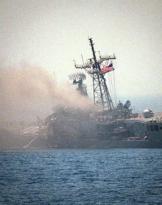This morning, the White House and the European Union after having known the outcome of the referendum, however, quite obvious, announced sanctions against the separatist leaders in Crimea, modeling the restrictive measures on people who have determined the current context in Ukraine. Brussels has commissioned sanctions for 21 people (Russian 13 and Ukrainian 8 of Crimea) "because they are held responsible for actions that have undermined the territorial integrity and sovereignty of Ukraine".
Among the recipients of the sanctions that aim to hit the Moscow economy, former Ukrainian President Viktor Yanukovych and some key figures of the Russian government such as Vladislav Surkov, Sergey Glazyev and Leonid Slutsky.
However, a diplomatic solution is being sought in an attempt to resolve one of the worst geopolitical crises of recent years.
Western allies are asking Putin to bring the crisis back, supporting plans for political reform in Ukraine, withdrawing Russian troops from Crimea and demobilizing the military contingent deployed near the border.
Putin, who will meet the representatives of the two chambers of parliament next Friday with the object of the annexation by the Crimea, continues to judge the referendum as legal, in full compliance with international law and the Charter of the United Nations as it happened for the independence of Kosovo from Serbia.
Meanwhile, the Ukrainian parliament voted for the partial mobilization of military reserves following tensions with Russia. President Oleksandr Turchynov's decree, which provides for the mobilization of tens of thousands of reservists, was approved by 275 of the 308 deputies. The mobilization, according to the text of the decree, will have to be completed in 45 days.
Russia is a giant but underestimating Ukraine would be a huge mistake
Ukraine has an army of 129,950 men, 17 ships, about 400 aircraft and a thousand tanks. The equipment is largely of Soviet origin, but the real dimensions of the Ukrainian military force, considering the internal divisions are practically unknown. It is certainly a NATO partner country, but it does not have the guarantees of armed intervention that belonging to the Atlantic Alliance would have guaranteed.
A comparison with the Russian army, under a purely numerical profile, would be merciless. Moscow, just to give an example, has an army of 845 thousand men. However, Putin should not underestimate the practice of Ukraine, because war is not won only by numbers. It is a common opinion that Russia has a huge army, but not so big as to invade Ukraine. Moscow cannot afford to economically assemble an invasion force, considering that many of its war components would not be able to guarantee border surveillance without the ground force that would inevitably be channeled into Ukraine.
Ukraine like Georgia?
There are many similarities between what happened in Georgia in the 2008 and the current situation in Ukraine, but the differences are profound. Do not forget that it was the Georgians who first opened fire in the 2008, while the Ukrainians continue to preach calmly, not giving Russia any reason to attack.
Finally, if it is true that on the one hand the Ukrainian military apparatus is obsolete and with a questionable combat readiness, on the other hand it should perform better than the small Georgian forces that faced the Russian offensive in the 2008. The Ukrainian equipment in fact, in many ways is a minor mirror image of the Russian forces.
Franco Iacch












